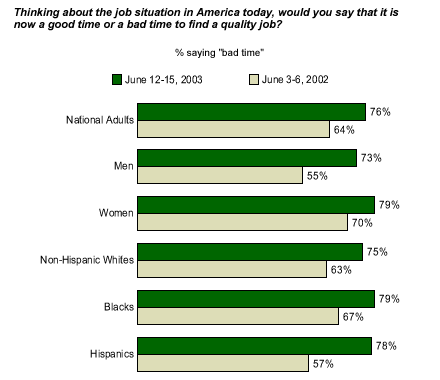Last month, the number of people looking for work increased by 360,000 to 9.4 million, while the number of non-farm jobs in the economy declined by 30,000. Obviously, this one-month deficit of more than a quarter of a million jobs is an explosive situation both politically and economically. Significantly, recent Gallup Poll economic data* suggest that today's dismal jobs outlook is also fully inclusive, affecting potential employment opportunities for people across lines of gender, race, and ethnicity.
Unemployment Rates
In June, the unemployment rate increased from 6.1% to a nine-year high of 6.4%. While unemployment rates are increasing for both genders and across racial and ethnic lines, the rates are higher for men than for women. They are also much higher for blacks than whites, with Hispanics falling in-between. The unemployment rate increased for both adult men (6.1%) and adult women (5.2%). The unemployment rate among whites increased to 5.5% in June, while that among blacks and Hispanics reached 11.8% and 8.4%, respectively.
Bad Time to Find a Job
In June, three out of four Americans (76%) told Gallup that now is a "bad time" to find a quality job. This percentage is up from 64% a year ago and fully consistent with current Labor Department reports showing that the jobs recession has deepened over the past year. However, despite their different unemployment rates, men, women, whites, blacks, and Hispanics all have a dismal view of today's job market.
This time last year, somewhat more than half of all men (55%) said that it was a bad time to find a quality job. Now, nearly three-fourths (73%) of men feel this way. A somewhat larger percentage of women (79%) have negative feelings about the jobs outlook in June 2003, but this gender gap is much smaller than it was a year ago.
Three in four non-Hispanic whites (75%) feel that now is a bad time to find a quality job, up 12 percentage points from last year. A similar percentage of blacks (79%) and Hispanics (78%) also hold this highly negative view of the jobs market. In fact, the percentage of people feeling now is a bad time to find a quality job has increased across racial and ethnic groups over the past year. Hispanics show the largest increase in pessimism of 21 points, from 57% to 78%.

When Will the Jobs Recession End?
Highly stimulative monetary and fiscal policies have combined with increasing consumer, investor, and employee optimism to virtually dictate the current economic outlook. While the Fed did not come through with a full 50-basis-point cut in rates last month as many had hoped for, traditional economic analysis still suggests that the U.S. economy should pick up momentum in the months ahead, with a real recovery getting underway just in time for the year-end holidays.
Right now, however, the jobs recession continues to dominate today's economy. Traditional analysis implies that as economic growth increases, the jobs outlook will improve significantly. But will this be the case? This complex issue is likely to attract a great deal of political and economic attention in the months ahead. Particularly because the jobs recession is not only impacting minorities and women, but all employee groups.
Can U.S. businesses grow based on increased productivity and an expanded use of workers overseas? Can a growing economy dominate a stagnant jobs market economically and/or politically? Is the current jobs recession more structural than cyclical? The answers to these questions will tell us when the jobs recession will end and whether it will end for those looking for work in some demographic groups before others.
*Results are based on telephone interviews with 1,385 national adults, aged 18 and older, conducted June 12-18, 2003, including oversamples of blacks and Hispanics that are weighted to reflect their proportions in the general population. For results based on the total sample of national adults, one can say with 95% confidence that the maximum margin of sampling error is ±3%.
Results for the sample of 668 men, aged 18 and older, are based on telephone interviews conducted June 12-18, 2003. For results based on the total sample, one can say with 95% confidence that the margin of sampling error is ±4%. [Results for Q.1-10 based on June 12-15 sample of 489 men; the maximum margin of sampling error is ±5%.]
Results for the sample of 717 women, aged 18 and older, are based on telephone interviews conducted June 12-18, 2003. For results based on the total sample, one can say with 95% confidence that the margin of sampling error is ±4%. [Results for Q.1-10 based on June 12-15 sample of 517 women; the maximum margin of sampling error is ±5%.]
Results for the sample of 821 non-Hispanic whites, aged 18 and older, are based on telephone interviews conducted June 12-15, 2003. For results based on the total sample, one can say with 95% confidence that the margin of sampling error is ±4%.
Results for the sample of 241 blacks, aged 18 and older, are based on telephone interviews conducted June 12-18, 2003. For results based on the total sample, one can say with 95% confidence that the margin of sampling error is ±7%.
Results for the sample of 266 Hispanics (including 12 Hispanic respondents who identify their race as black), aged 18 and older, conducted June 12-18, 2003. For results based on the total sample, one can say with 95% confidence that the margin of sampling error is ±7%. (53 out of the 266 interviews with Hispanics were conducted in Spanish).
In addition to sampling error, question wording and practical difficulties in conducting surveys can introduce error or bias into the findings of public opinion polls.

